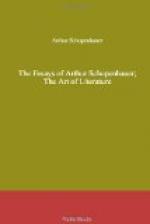Like the ordinary man, the genius is what he is chiefly for himself. This is essential to his nature: a fact which can neither be avoided nor altered, he may be for others remains a matter of chance and of secondary importance. In no case can people receive from his mind more than a reflection, and then only when he joins with them in the attempt to get his thought into their heads; where, however, it is never anything but an exotic plant, stunted and frail.
In order to have original, uncommon, and perhaps even immortal thoughts, it is enough to estrange oneself so fully from the world of things for a few moments, that the most ordinary objects and events appear quite new and unfamiliar. In this way their true nature is disclosed. What is here demanded cannot, perhaps, be said to be difficult; it is not in our power at all, but is just the province of genius.
By itself, genius can produce original thoughts just as little as a woman by herself can bear children. Outward circumstances must come to fructify genius, and be, as it were, a father to its progeny.
The mind of genius is among other minds what the carbuncle is among precious stones: it sends forth light of its own, while the others reflect only that which they have received. The relation of the genius to the ordinary mind may also be described as that of an idio-electrical body to one which merely is a conductor of electricity.
The mere man of learning, who spends his life in teaching what he has learned, is not strictly to be called a man of genius; just as idio-electrical bodies are not conductors. Nay, genius stands to mere learning as the words to the music in a song. A man of learning is a man who has learned a great deal; a man of genius, one from whom we learn something which the genius has learned from nobody. Great minds, of which there is scarcely one in a hundred millions, are thus the lighthouses of humanity; and without them mankind would lose itself in the boundless sea of monstrous error and bewilderment.
And so the simple man of learning, in the strict sense of the word—the ordinary professor, for instance—looks upon the genius much as we look upon a hare, which is good to eat after it has been killed and dressed up. So long as it is alive, it is only good to shoot at.
He who wishes to experience gratitude from his contemporaries, must adjust his pace to theirs. But great things are never produced in this way. And he who wants to do great things must direct his gaze to posterity, and in firm confidence elaborate his work for coming generations. No doubt, the result may be that he will remain quite unknown to his contemporaries, and comparable to a man who, compelled to spend his life upon a lonely island, with great effort sets up a monument there, to transmit to future sea-farers the knowledge of his existence. If he thinks it a hard fate, let him console himself with the reflection




